🎗️Lonny's War Update- October 671, 2023 - August 7, 2025 🎗️
🎗️Day 671 that 50 of our hostages are still in Hamas captivity🎗️
**There is nothing more important than getting them home! NOTHING!**
“I’ve never met them,But I miss them. I’ve never met them,but I think of them every second. I’ve never met them,but they are my family. BRING THEM HOME NOW!!!”
There is no victory until all of the hostages are home!אין נצחון עד שכל החטופים בבית
Red Alerts - Missile, Rocket, Drone (UAV - unmanned aerial vehicles), and Terror Attacks and Death Announcements
*
Danny Elgarat, whose brother Itzik died in captivity in Gaza and whose body was returned to Israel in the last ceasefire and hostage release deal early in the year, said he had received a message from his brother when he was held hostage."Intelligence officials called us today and told us they managed to obtain materials showing Itzik in a video," Elgarat told Ynet on Wednesday. "We finally received a sign of life, after two years - a sign of life from the dead."
He said watching his now-dead brother was difficult. "I watched the clip with my children, he said. "He was very thin, scared and confused. I could see in his eyes that he understood he would probably never leave there alive. He was begging for his life in the video." Elgarat said adding that he is waiting for his brother's children to return to Israel from abroad. "The moment the video is in my possession - I will release it."
Itzik Elgarat was abducted from Nir Oz when he was 69 years old, was the groundskeeper at Nir Oz. "He was an integral part of the social fabric, loved spending time at the local pub, hosting friends and connecting generations," his neighbors at the Kibbutz said. "His passion for soccer and backgammon was well known, and he was a star of local games—always with a smile and good spirit. Link
Hostage families, opposition decry reported plan to occupy Gaza as risk to captives
Lapid says plan ‘will lead to all the hostages dying,’ as freed captives reportedly warn Hamas terrorists had sensors to detect approaching troops, bombs ready to detonate
Hostage families and opposition lawmakers on Tuesday decried the government’s reported plan to occupy the entire Gaza Strip, even at the risk of endangering hostages still held there by the Hamas terror group.
“The direction in which the cabinet and government are heading will lead to all the hostages dying – of hunger, beatings and torture – or being killed during IDF operations,” said Opposition Leader Yair Lapid in a sharply worded statement.
“In exchange, we’ll be ruling over two million Palestinians—paying for their electricity and water, building them schools and hospitals with Israeli taxpayers’ money,” he continued. “You annex — you pay. From that moment, everything is on us.”
“Reservists will continue paying the price of draft dodging,” Lapid said. “Taxpayers will pay the price of annexation.” Additionally, he warned that such a move would isolate Israel internationally and erase any hope of regional support for postwar reconstruction.
The Democrats leader Yair Golan, in a video posted to social media, said: “Dear parents – look at your children. If the disturbed, messianic vision of Smotrich and Ben Gvir is realized, your children, too, who are entering first grade, will fall in a forever war in Gaza.”
The former general further singled out Finance Minister Bezalel Smotrich and National Security Minister Itamar Ben Gvir, saying the two far-right officials “never wanted to return the hostages.”
“Smotrich and Ben Gvir always wanted occupation, settlement, and a military government in Gaza; to realize their fanatical vision, they will sacrifice the hostages, they will sacrifice the soldiers,” Golan said.
He warned that “anyone who opposes their total messianic insanity will immediately be painted as a traitor — exactly as they’re doing now to the IDF Chief of Staff [Eyal] Zamir, who a moment ago they were celebrating.”
The IDF chief is widely reported to oppose occupying the entire Gaza Strip.
Hostage’s mother: IDF chief should resign if plan approved
Anat Angrest, whose son Matan Angrest is held captive in Gaza, told Channel 12 that families of hostages are in touch with Zamir, and that she knows he opposes any action that will put hostages’ lives at risk.
“If the government decides to expand the war to areas where hostages are held, I expect Zamir to resign from his position and say clearly — I will not endanger the hostages,” Angrest told the network.
She also noted that her son Matan is a soldier, for whom Zamir is responsible, saying, “I don’t believe that, as his commander, [Zamir] would send soldiers, not to rescue a wounded [soldier] in the field, but rather to endanger and kill him.”
Still, Angrest said she is afraid the government will go ahead with the controversial plan, noting that “they replaced all the security officials who supported a deal some time ago,” referring to the government’s ousting of former defense minister Yoav Gallant, former Shin Bet head Ronen Bar and former IDF chief of staff Herzi Halevi.
Anat Angrest, holding a photo of her son Matan, who is held hostage in Gaza, shouts at MK Simcha Rothman in the Knesset in Jerusalem, on August 4, 2025. (Yonatan Sindel/Flash90)“I’m also hearing from soldiers who are fighting, that they get the sense the plan is to tear-down-and-rebuild, that little by little, they’re knocking down another building and another building, and preparing the ground to realize the fantasy of new settlement,” she said
Gal Gilboa-Dalal, whose brother Guy Gilboa-Dalal is held captive in Gaza, told Channel 12, “We can’t give ourselves permission” to endanger the hostages through military operations where they are held, adding, “We have to get them out alive, those who have survived until now.”
“At the same time, I don’t believe in sitting and waiting for Hamas to give them over,” he said. “It won’t happen. Without military pressure, they won’t return. I hope we know what we’re doing.”
Meanwhile, hundreds of people gathered Tuesday for a sit-in on Tel Aviv’s Kaplan Street, outside the Defense Ministry headquarters, led by Shift 101, the mostly silent, white-clad activist group.
The protesters, led by Viki Cohen, mother of hostage Nimrod Cohen and Maccabit Meir, aunt of hostages Ziv and Gali Berman, along with others, marched to Kaplan Street from Dizengoff Square.
“This government is ruining all of our values,” said Cohen. “We’re hearing talk about conquering Gaza, that will be a death sentence for our hostages, it will turn them into Ron Arads,” she added, referring to the Air Force navigator captured in Lebanon in 1986 and never released. “We can’t allow that to happen, and that’s why we’re here to continue fighting, to say, ‘Enough, stop.’”
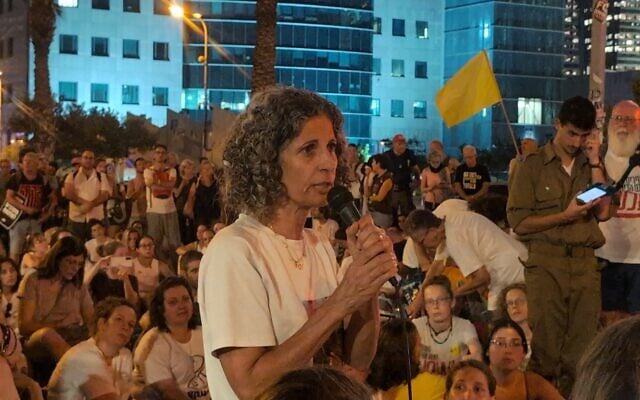 Vicky Cohen, mother of hostage Nimrod Cohen, speaking to protesters sitting-in in front of the Kirya IDF Military Headquarters, August 5, 2025. (Tanya Zion-Waldoks / Pro-Democracy Protest Movement)
Vicky Cohen, mother of hostage Nimrod Cohen, speaking to protesters sitting-in in front of the Kirya IDF Military Headquarters, August 5, 2025. (Tanya Zion-Waldoks / Pro-Democracy Protest Movement)Cohen told Netanyahu that the time has come to stop with his desire for revenge, to listen to the people and stop the war, and return all the hostages so that Israeli society can begin rebuilding itself and burying its dead.
Idit Ohel, mother of hostage Alon Ohel, said she did not have a lot to say, except that she misses her son immensely.
“I so miss him that sometimes I forget how it is to be the mother of Alon,” said Ohel. “It’s hard to speak, it’s hard to stand, it’s hard to walk. The hardest is to breathe, knowing your son is in that place. I don’t wish this upon anyone.”
At the end of the demonstration, the protesters sang a song to mark what would have been the sixth birthday of Ariel Bibas, taken captive with his mother and younger brother on October 7, 2023, and killed in captivity. His body was returned for burial in February.
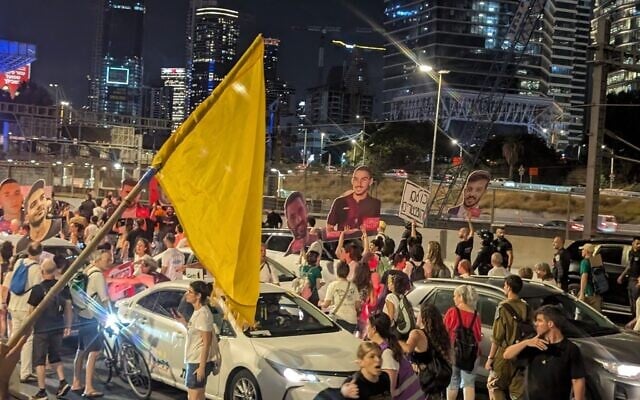 Protesters block Ayalon Highway in Tel Aviv as they demonstrate against a reported plan to occupy Gaza despite risk to hostages, on August 5, 2025. (Tanya Zion-Waldoks/Pro-Democracy Protest Movement)
Protesters block Ayalon Highway in Tel Aviv as they demonstrate against a reported plan to occupy Gaza despite risk to hostages, on August 5, 2025. (Tanya Zion-Waldoks/Pro-Democracy Protest Movement)Dozens of protesters also briefly blocked traffic on Tel Aviv’s Ayalon Highway.
Hamas said able to detect IDF troops if they near hostages
Channel 12 also reported on Tuesday that freed hostages have warned security officials, as well as the families of captives still held in Gaza, that Hamas has technological means — such as cameras with sensors, or bombs ready to be set off — to detect approaching IDF forces.
There is precedent for Hamas killing captives when Israeli soldiers are nearby: Last summer, Hamas captors murdered six hostages who were held in a tunnel under the southern city of Rafah, as the IDF operated in the area. Days later, the hostages were found dead.
This combination of six undated photos shows hostages, from top left, Hersh Goldberg-Polin, Ori Danino, Eden Yerushalmi; from bottom left, Almog Sarusi, Alexander Lobanov, and Carmel Gat. They were murdered by their Hamas captors in Gaza in August 2024. (The Hostages Families Forum via AP)The war in Gaza began October 7, 2023, when thousands of Hamas-led terrorists invaded Israel, killing some 1,200 people and taking 251 hostages.
Twenty hostages are still believed to be alive in captivity, while twenty-eight have been confirmed dead, and Israel has expressed grave concern about two more. The figures include the body of a soldier killed in 2014.
Hamas released 30 hostages — 20 Israeli civilians, five soldiers, and five Thai nationals — and the bodies of eight slain Israeli captives during a ceasefire between January and March, and one additional hostage, a dual American-Israeli citizen, in May as a “gesture” to the United States. The terror group also freed 105 civilians during a weeklong truce in late November 2023, and four hostages were released before that in the early weeks of the war.
In exchange, Israel has freed some 2,000 jailed Palestinian terrorists, security prisoners, and Gazan terror suspects detained during the war.
Eight hostages have been rescued from captivity by troops alive, and the bodies of 49 have also been recovered, including three mistakenly killed by the Israeli military as they tried to escape their captors, and the body of a soldier who was killed in 2014. Link The upcoming order by Netanyahu which will definitely be approved by the do nothing cabinet will have major effects on the country for many, many years to come. There will be the immediate effects and then the long term effects of which will change the country for the worse forever.
The immediate effects and impacts: The military expansion into Gaza City and other areas that the IDF has deliberately not fought any major battles due to the high risks of hurting and/or killing of the hostages. In complete and total opposition to the IDF Chief, the government order will most likely result in the deaths of most or all of the living hostages. Aerial bombing has already killed and injured many of the hostages who have returned and they have told of the trauma of the bombings and the implications and of the deaths of hostages as a result. And if they aren't killed by our bombing, their fates are known. Hamas terrorists guards have long time standing orders to kill any and all hostages they are guarding if they believe any soldiers are in the area where the hostages are being held. This is not theoretical. There have already been at least 10 close range executions of hostages by the Hamas terrorist guards who felt that the soldiers were nearby. As has been detailed in the article, the terrorists have rigged up multiple electronic measures both to detect soldiers in the area and to execute the hostages if there are soldiers. nearby. This is know by the army and the political echelon starting with Netanyahu. If something were to happen in this way, he would fake his 'shock and surprise' and claim that he had no idea this could happen to them, just as he lied and faked shock at the pictures of starving Evyatar David and Rom Braslaski. Everyone knows he lied because he is given updates on the situation of all the hostages, some with better data than others, but he knows and no amount of his lies will ever change that.
Further implications are for our soldiers. MORE WILL BE KILLED AND MAIMED! That is an inevitable effect of the expansion of the war and fighting. There are more terrorist fighters in places like Gaza City and they have also had almost 2 years to booby trap so many of the buildings, tunnels and infrastructure and they are likely better trained than the many new recruits in other areas that the IDF has evacuated in the past. Gaza is a quagmire, a deep and painful swamp that Netanyahu is choosing to go into deeper and with more soldiers. For him and his political survival, both the soldiers and the hostages are nothing more than cannon fodder for his personal needs. He doesn't care if they die or how many. A senior advisor to Netanyahu shared that Netanyahu said that he can deal with another 200 bereaved families. The depravity and callousness of a man who just doesn't give a damn.
And yet further immediate implications: The worsening of the Gaza refugee problem with humanitarian care . We have created a refugee crisis of monumental proportions- 2 million people who have be uprooted from their homes, which have been totally destroyed and then evacuated multiple times so the army could continue their impacts.
The long term implications: being a pariah state of the world and cut off from major issues that will worsen regularly. Many Universities and medical research labs and companies have already cut off ties with Israel. Israelis are already at risk traveling in many places in the world where there have been overt physical attacks on Israelis and Jews, as well as physical and verbal abuse and refusal to serve Israelis at restaurants and hotels. What we are seeing today is only the tip of the iceberg to come. In several countries, authorities have threatened arresting Israelis who have been soldiers in Gaza with some having to surreptitiously leave the countries they were visiting. Trade agreements are already under attack and being stopped and this will grow as well until very few countries will trade with Israel.
Arrest warrants by the ICC and by individual countries will be issued against senior IDF officers, ministers (who highly deserve them), and then to junior officers and soldiers who were doing the fighting. This will be clearly seen as the whole country is under indictment and there will be a growing list of countries that will warn Israelis not to consider going to them.
More long term implications: Israel will never heal from October 7, the massacre and the taking of 251 hostages, and the almost two years of the war. Without the hostages being brought home, with the living to rehabilitation and the dead to proper burial in Israel, we will be a nation that cannot leave its trauma behind - it will be a combination of post trauma and current trauma for the multitudes who are not able to get out of October 7 until the hostages are brought home.
Our soldiers (regular army and reserves) will need to serve longer periods of duty and be at daily risk of being killed or injured by the occupation of Gaza. The guerilla war will not end and Hamas will not be defeated. Many more Israelis will leave the country they are no longer able to live in because of the moral and political degradation as well as the long term trauma of the war and the government's abandonment of its citizens.
I could go on and on about more and more immediate and long term implications but I think the message is clear.
Netanyahu and his corrupt government are so recklessly causing irreversible damage to the country all in the name of Netanyahu's war of political survival and the messianics mission to be a Jewish Iran with no Arabs and no opposition.Hostages’ families set sail to call for loved ones’ release
Relatives of Israeli hostages have set sail in a flotilla presented as allowing them to approach the Gaza Strip and get close to their loved ones.
“A boat carrying families of hostages has just departed to sea, heading south to get as close as possible to their loved ones,” a statement from the Hostage Families Forum reads.
More than 20 people boarded several sailboats that departed from the coastal city of Ashkelon carrying yellow flags and posters bearing the images of the hostages, as they shouted their names.
Speaking in English through a megaphone, Yehuda Cohen, whose son Nimrod is being held captive in Gaza, shouts: “Mayday, mayday, mayday. We need all international assistance to rescue the 50 hostages who are nearly two years held by the hand of Hamas.”
 Relatives of Israeli hostages held by Hamas sail off Ashkelon, August 7, 2025. (Nadav Porat Hamski / Hostages Families forum)
Relatives of Israeli hostages held by Hamas sail off Ashkelon, August 7, 2025. (Nadav Porat Hamski / Hostages Families forum)“Please, we need international help,” Cohen adds.
According to marine tracker date for one of the boats in the flotilla, the vessel sailed some 2 nautical miles away from Ashkelon before turning back, and never reached closer than 5 nautical miles from Gaza’s waters.
Hostages’ families ask army to resist Gaza takeover plan, urge protest outside decisive meet
The mother of hostage Matan Zangauker calls for Israelis to protest outside a cabinet meeting scheduled for tonight where the country’s political leaders are expected to approve a plan expanding military operations in the Strip, saying Israel is reaching “the point of no return” for a hostage release deal.
Einav Zangauker says on X that Prime Minister Benjamin Netanyahu promised her he would pursue a deal to free the hostages, “but took advantage of my pain, of the families, of the whole hurt nation [and] killed the deal.”
“Someone who talks about a comprehensive deal doesn’t go and conquer the Strip and put hostages and soldiers in danger,” she writes.
“Netanyahu and his partners are about to condemn [Matan] to death,” she adds in a video statement, calling for protesters to “flood the streets of the nation starting tonight.”
In a separate statement, the Hostage Families Forum urges IDF chief Eyal Zamir to stand up against the plan, but stops short of joining Zangauker’s call for protests.
“Chief of staff, we are asking you to stand strong. You are the supreme commander. Don’t consent to endanger our loved ones,” it says in a statement.
The group says public sentiment supports a deal that will free all 50 hostages, including at least 28 thought to have been killed. “Any other decision will be clearly inhumane and spell disaster for the hostages and the whole of Israel,” the group says.
“The families of the hostages call on IDF commanders at all levels not to act in a way that will endanger hostages’ lives and block the possibility of the return of the bodies,” the statement reads.
The security cabinet is expected to convene at 6 p.m. tonight to decide on the plan, which would aim to bring most of the Strip under IDF control, dismantling Hamas and pressuring it to return the hostages, after talks for a deal broke down last month.
The military has warned such a move would endanger hostages’ lives.
How Hamas secretly moves millions to pay members during the Gaza war
Despite crippling military losses, Hamas has continued paying thousands of members through a covert cash delivery system; The BBC reports the group moved $7 million to 30,000 'civilian wing' staff during the war, drawing on $700 million hidden in tunnels
Despite being severely weakened since its deadly October 7 terror attack on Israeli communities, Hamas has continued paying salaries to its members through a clandestine, cash-based system.According to a BBC report published Wednesday, the group managed during the war to pay roughly $7 million to about 30,000 employees of its so‑called “civilian wing,” despite most of its military power being destroyed by the IDF.Three members of that civilian apparatus told the BBC they recently received payments of about $300 each, at a time when Gaza residents report sharp price hikes and soaring inflation, alongside claims that Israel is “starving” the enclave.The report said many Hamas members have continued receiving only about 20% of their pre‑war salaries, usually once every two and a half months. This delay, combined with the reduced amounts, has fueled anger among the group’s rank and file.With Gaza’s financial institutions largely defunct and Israeli strikes targeting cash distribution points, Hamas has adapted its payment method. Members receive text messages on their own or their relatives’ phones inviting them to “have tea with a friend” at a designated location. There, a stranger—sometimes a woman—hands over an envelope stuffed with cash.“Every time I go to collect my salary, I say goodbye to my wife and children,” one Hamas member said, describing the process as dangerous. He claimed to have survived an Israeli strike on a cash distribution point at a Gaza City market.Another recipient, a teacher employed by the Hamas-run government, complained about the poor condition of the currency. “I got NIS 1,000 in very worn bills—no merchant wanted them. Only NIS 200 were usable,” he said, adding that after months without pay, he sometimes queued for U.S. aid group GHF’s food distribution in hopes of finding flour to feed his children.The BBC cited a senior Hamas figure familiar with the process who said the group had hidden about $700 million in cash inside tunnels before Oct. 7. The money, he said, was secured under the close supervision of Hamas leader Yahya Sinwar—now killed by Israel—and his brother Mohammed, also killed in the war.Hamas finances itself partly through taxes and customs fees on Gaza’s residents and traders, as well as significant funding from Qatar. Even during the conflict, the group continued to levy tariffs and sell goods directly.For many civilians, the disparity is infuriating. Nisreen Khaled, a widow raising three children, told the BBC her neighbors—Hamas supporters—received sacks of flour and food packages while her family went hungry. “Aren’t they the reason for our suffering? Why didn’t they make sure we had food, water, and medicine before they launched their Oct. 7 adventure?” she said. LinkTroop blow up Gaza City tunnel, find rocket launchers in graveyard
A kilometer-long Hamas tunnel was demolished by combat engineers during recent operations in the area of Gaza City’s Daraj and Tuffah neighborhoods, the military says.
The tunnel was uncovered by troops of the 401st Armored Brigade and the elite Yahalom combat engineering unit.
The IDF says the troops also found rocket launchers in a cemetery in the area. LINK
Gaza and the South

Has al-Shara lost support from his key backer?
Once the hope of the post-Assad era, Ahmed al-Sharaa’s leadership has faltered because of sectarian violence, political divisions, and loss of credibility
[Damascus] At the beginning of 2025, Syria witnessed a pivotal political moment in its modern history: the fall of Bashar Assad's regime after more than a decade since the outbreak of the revolution.Despite the chaos and division that characterized the previous years, the fall of Assad's regime seemed like a true glimmer of hope, opening the door to a transitional phase that could lead the country toward rebuilding itself as a democratic civil state.The appointment of Ahmad al-Sharaa, a technocrat and independent figure with a civilian background, as head of the transitional phase received unusually broad international support. This backing came from the United States, Britain, and France, along with regional powers such as Saudi Arabia, Qatar, and Turkey, all of whom viewed him as a consensus figure capable of steering Syria toward stability.However, the hope was short-lived. Within months of forming the transitional government, signs of disorder reemerged. Violence broke out along the Syrian coast, and unprecedented protests erupted in Sweida. These events coincided with a direct and uncharacteristic Israeli airstrike targeting Syria’s Ministry of Defense in the heart of Damascus—a blow that shattered the image of the new state and left the government exposed to growing questions of legitimacy, sovereignty, trust, and governability.Ahmad al-Sharaa was neither a prominent figure in the opposition nor a remnant of the previous regime. He emerged as a consensus choice dictated by circumstance and was embraced due to his calm, nonconfrontational demeanor, relatively clean record, especially after publicly cutting ties with al-Qaida and declaring war on the Islamic State (IS), and his ability to communicate pragmatically with both domestic and international audiences.His name was well known in academic and legal circles, and he had previously contributed to local reconciliation initiatives during moments of civil escalation.It was clear from the outset that the international bet on al-Sharaa was not on a transformative political leader but on a transitional figure, one who could manage fragility, not resolve it.Still, the support he received was fragile and conditional, tied to expectations of swift performance and visible results. When those failed to materialize, support began to recede.The Syrian coastal regions, deeply entwined with the former regime through sectarian, security, and economic ties, became one of the most complex arenas post-Assad. When the transitional government attempted to assert authority by dismantling local militias once aligned with the defunct Ministry of Defense, violent clashes erupted. These quickly escalated into what many described as an armed rebellion, implicitly supported by remnants of Assad’s security apparatus3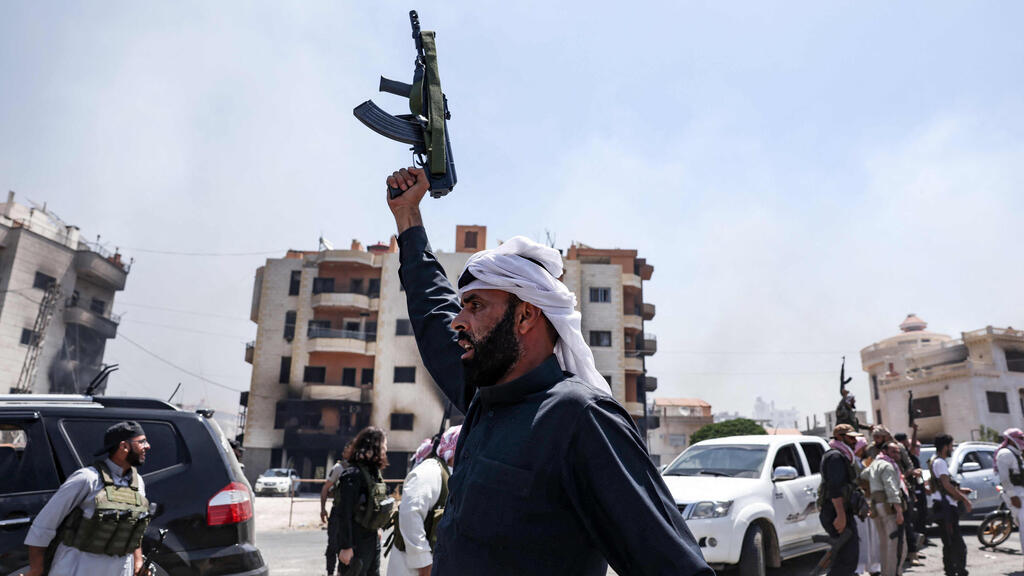 Violent clashes in Sweida (Photo: Bakr Alkasem/ AFP)Reports confirmed that factions of the “Popular Committees” loyal to the old regime refused to disarm, viewing the transitional government as a threat to their sectarian identity.The government failed to gauge the sensitivity of the situation. It lacked a coherent negotiation strategy and imposed centralized decisions without recognizing the deeply rooted fears within the Alawite community. These moves were seen by many as a veiled political purge.Israel and Iran both closely monitored the unfolding events, each with its agenda. Tehran provided indirect support to the rebellion, while Moscow attempted mediation, without success.The result: hundreds killed and widespread displacement in a region once seen as Assad’s strongest base. More importantly, the coastal crisis exposed the inability of the transitional government to project authority, not even symbolically.Sweida: A renewed civil revoltIn southern Syria, Sweida, home to a Druze majority, witnessed a resurgence of civil protests. Initially peaceful, the movement transformed into open defiance after the military’s aggressive efforts to enforce conscription and security.These protests were not sudden; they reflected years of accumulated frustration, first with the Assad regime, which failed to protect the region from IS, and then with an opposition that never truly represented the Druze community.The transitional government, perceived as disconnected from local realities, became the new target of public outrage. Civilian casualties during the protests only deepened public resentment. Videos circulated showing government troops beating demonstrators, reinforcing fears that the new state retained the repressive practices of its predecessor.
Violent clashes in Sweida (Photo: Bakr Alkasem/ AFP)Reports confirmed that factions of the “Popular Committees” loyal to the old regime refused to disarm, viewing the transitional government as a threat to their sectarian identity.The government failed to gauge the sensitivity of the situation. It lacked a coherent negotiation strategy and imposed centralized decisions without recognizing the deeply rooted fears within the Alawite community. These moves were seen by many as a veiled political purge.Israel and Iran both closely monitored the unfolding events, each with its agenda. Tehran provided indirect support to the rebellion, while Moscow attempted mediation, without success.The result: hundreds killed and widespread displacement in a region once seen as Assad’s strongest base. More importantly, the coastal crisis exposed the inability of the transitional government to project authority, not even symbolically.Sweida: A renewed civil revoltIn southern Syria, Sweida, home to a Druze majority, witnessed a resurgence of civil protests. Initially peaceful, the movement transformed into open defiance after the military’s aggressive efforts to enforce conscription and security.These protests were not sudden; they reflected years of accumulated frustration, first with the Assad regime, which failed to protect the region from IS, and then with an opposition that never truly represented the Druze community.The transitional government, perceived as disconnected from local realities, became the new target of public outrage. Civilian casualties during the protests only deepened public resentment. Videos circulated showing government troops beating demonstrators, reinforcing fears that the new state retained the repressive practices of its predecessor.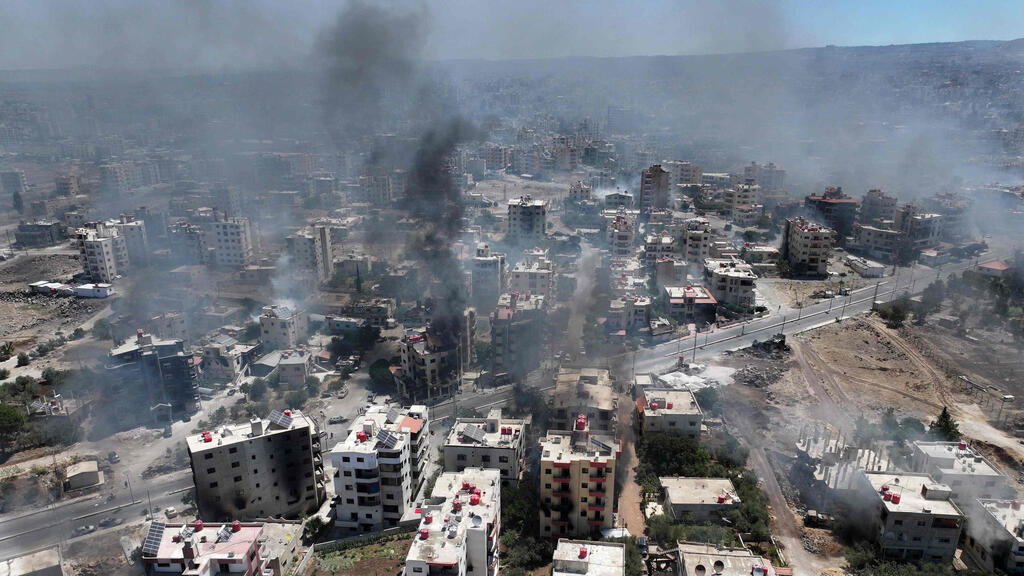 Sweida (Photo: Omar Haj Kadour/ AFP)As a result, several Druze political figures withdrew from the transition process, and calls for local self-rule or autonomy began to surface.The Israeli airstrike on the Ministry of Defense in central Damascus was not just military—it was deeply political. It signaled that Tel Aviv did not recognize the transitional government as a reliable partner and believed the core structure of Syria's military and intelligence apparatus remained unchanged.The al-Sharaa administration’s muted response revealed its political fragility and sparked renewed doubts among Western powers about its capacity to uphold Syrian sovereignty.The United States—an early supporter of al-Sharaa—issued no clear condemnation. Observers interpreted Washington’s silence as a signal that Syria had been downgraded as a priority.The withdrawal of support for al-Sharaa wasn’t merely the result of his government’s shortcomings. It reflected a broader geopolitical recalibration.In Washington, shifting priorities—particularly in the Red Sea and East Asia—pushed Syria down the agenda.In the Gulf, interest in engaging the new regime clashed with fears of hidden Iranian influence, despite Syria having cut ties with Tehran.Turkey, consumed by domestic challenges and its careful balancing act with Moscow, chose cautious disengagement.All of this rendered support for the transitional government unstable and easily eroded.“What happened in Syria after the fall of the regime is not unusual for transitions from authoritarian systems,” Dr. Samer al-Hassan, a Damascus-based expert in political transitions, said. “A figure like Ahmad al-Sharaa, despite his civilian symbolism, was not backed by an institutional framework or genuine consensus among internal forces. International support alone is insufficient if it is not translated into practical tools that address the deep social fractures left by decades of autocratic rule.”Meanwhile, Dr. Nadine al-Shawa, a Beirut-based researcher in regional security and international relations, offered a similar perspective:“Al-Sharaa’s experience exposed the fragility of international consensus regarding Syria. The withdrawal of Washington and the hesitation of Gulf capitals stem from the lack of a shared vision for post-Assad Syria. The unrest in the coastal region and the south is a dangerous indicator of central authority disintegration, and it suggests that no transitional process can succeed without genuine decentralization and clear regional agreements.”A March 2025 report by the International Crisis Group framed Syria’s transitional crisis in stark terms:“The transitional phase in Syria is undergoing a severe test of legitimacy. The failure cannot be attributed to al-Sharaa’s government alone; the absence of real international agreements on the future of the military institution, along with limited economic support, has created an ungovernable environment. It appears that the time has come for a shift in the international community’s approach—from supporting individuals to rebuilding institutions.”Given the current landscape, Syria appears incapable of overcoming its crisis without a new national project—one that transcends the zero-sum logic of winners and losers. What is required is not merely a set of political deals between elites but a deeper reconciliation between the state and its fractured local communities.This must begin with a recognition of Syria’s pluralism and the creation of a decentralized state model—potentially federal—granting broad autonomy to regions.Secondly, a high-level transitional justice committee, overseen by the United Nations, should be established to address the fate of detainees and the missing, and to administer symbolic accountability of former regime officials while avoiding political vendettas.On the security front, Syria’s military must be rebuilt from the ground up: professional, national, and inclusive—integrating former factions into a unified institution monitored and supported by an international oversight mission.And regionally, there will be no peace in Syria without a comprehensive framework involving Turkey, Iran, and Saudi Arabia alongside a renewed understanding between Washington and Moscow over the future structure of the Syrian state.Syria now stands at a historic crossroads. It can either move toward a long-awaited political settlement that lifts it from decades of bloodshed and fragmentation, or it may descend into even more brutal and chaotic conflict.The experience of Ahmad al-Sharaa has made one truth clear: Good intentions are not enough. Political transitions require real governing frameworks, strong domestic consensus, and unwavering international support. Without this triad, Syria will remain trapped between the wreckage of its authoritarian past and the broken promises of its revolution. Link
Sweida (Photo: Omar Haj Kadour/ AFP)As a result, several Druze political figures withdrew from the transition process, and calls for local self-rule or autonomy began to surface.The Israeli airstrike on the Ministry of Defense in central Damascus was not just military—it was deeply political. It signaled that Tel Aviv did not recognize the transitional government as a reliable partner and believed the core structure of Syria's military and intelligence apparatus remained unchanged.The al-Sharaa administration’s muted response revealed its political fragility and sparked renewed doubts among Western powers about its capacity to uphold Syrian sovereignty.The United States—an early supporter of al-Sharaa—issued no clear condemnation. Observers interpreted Washington’s silence as a signal that Syria had been downgraded as a priority.The withdrawal of support for al-Sharaa wasn’t merely the result of his government’s shortcomings. It reflected a broader geopolitical recalibration.In Washington, shifting priorities—particularly in the Red Sea and East Asia—pushed Syria down the agenda.In the Gulf, interest in engaging the new regime clashed with fears of hidden Iranian influence, despite Syria having cut ties with Tehran.Turkey, consumed by domestic challenges and its careful balancing act with Moscow, chose cautious disengagement.All of this rendered support for the transitional government unstable and easily eroded.“What happened in Syria after the fall of the regime is not unusual for transitions from authoritarian systems,” Dr. Samer al-Hassan, a Damascus-based expert in political transitions, said. “A figure like Ahmad al-Sharaa, despite his civilian symbolism, was not backed by an institutional framework or genuine consensus among internal forces. International support alone is insufficient if it is not translated into practical tools that address the deep social fractures left by decades of autocratic rule.”Meanwhile, Dr. Nadine al-Shawa, a Beirut-based researcher in regional security and international relations, offered a similar perspective:“Al-Sharaa’s experience exposed the fragility of international consensus regarding Syria. The withdrawal of Washington and the hesitation of Gulf capitals stem from the lack of a shared vision for post-Assad Syria. The unrest in the coastal region and the south is a dangerous indicator of central authority disintegration, and it suggests that no transitional process can succeed without genuine decentralization and clear regional agreements.”A March 2025 report by the International Crisis Group framed Syria’s transitional crisis in stark terms:“The transitional phase in Syria is undergoing a severe test of legitimacy. The failure cannot be attributed to al-Sharaa’s government alone; the absence of real international agreements on the future of the military institution, along with limited economic support, has created an ungovernable environment. It appears that the time has come for a shift in the international community’s approach—from supporting individuals to rebuilding institutions.”Given the current landscape, Syria appears incapable of overcoming its crisis without a new national project—one that transcends the zero-sum logic of winners and losers. What is required is not merely a set of political deals between elites but a deeper reconciliation between the state and its fractured local communities.This must begin with a recognition of Syria’s pluralism and the creation of a decentralized state model—potentially federal—granting broad autonomy to regions.Secondly, a high-level transitional justice committee, overseen by the United Nations, should be established to address the fate of detainees and the missing, and to administer symbolic accountability of former regime officials while avoiding political vendettas.On the security front, Syria’s military must be rebuilt from the ground up: professional, national, and inclusive—integrating former factions into a unified institution monitored and supported by an international oversight mission.And regionally, there will be no peace in Syria without a comprehensive framework involving Turkey, Iran, and Saudi Arabia alongside a renewed understanding between Washington and Moscow over the future structure of the Syrian state.Syria now stands at a historic crossroads. It can either move toward a long-awaited political settlement that lifts it from decades of bloodshed and fragmentation, or it may descend into even more brutal and chaotic conflict.The experience of Ahmad al-Sharaa has made one truth clear: Good intentions are not enough. Political transitions require real governing frameworks, strong domestic consensus, and unwavering international support. Without this triad, Syria will remain trapped between the wreckage of its authoritarian past and the broken promises of its revolution. LinkIDF says strikes on Hezbollah targeted rocket launchers, weapons depots
The IDF says it carried out airstrikes on a series of Hezbollah targets in southern Lebanon a short while ago.
The targets included weapons depots, rocket launchers, and sites used to store construction vehicles that were used by the terror group to restore its infrastructure, according to the military.
“The Hezbollah terror organization continues its attempts to restore terror infrastructure throughout Lebanon, while endangering Lebanese civilians and using them as human shields,” the IDF says, adding that the presence of weapons and Hezbollah’s activity in the area “constitutes a violation of the understandings between Israel and Lebanon.”
Since the beginning of a ceasefire in November 2024, the IDF says it has carried out over 500 airstrikes against Hezbollah targets in Lebanon, killing at least 230 operatives and destroying dozens of sites belonging to the terror group, saying they violated the terms of the truce.
Smotrich appears in picture next to ‘Death to Arabs’ graffiti, disavows message
Far-right Finance Minister Bezalel Smotrich disavows calls to kill Arabs after the Samaria Regional Council distributes a photograph of him visiting the former West Bank settlement of Sa-Nur in which he can be seen standing and smiling next to graffiti reading “death to Arabs.”
Smotrich’s office says in a statement that the slur was only noticed “after the photo was distributed and of course we completely disavow” its message.
The picture was taken this morning, as Smotrich visited the site to mark 20 years since its evacuation. The Samaria Regional Council, whose leader Yossi Dagan is also in the picture, later sent out a second press release with the graffiti cropped out.
Smotrich’s office says the media shouldn’t be concerned by “stupid graffiti that no one noticed” but by the minister’s drive to “reverse the expulsion from northern Samaria and resettle Sa-Nur.”
Condemning Smotrich, Opposition Leader Yair Lapid asks, “What in God’s name does the government expect us to say to the world when a photo is published of a senior minister smiling next to the inscription ‘Death to Arabs’?”
In May, Defense Minister Israel Katz confirmed that the government had approved the construction of 22 new West Bank settlements, including Sa-Nur and Homesh, which were forcibly cleared in 2005 alongside Israel’s disengagement from the Gaza Strip. link Smotrich's office's disavowal of the 'message' is such a load of crap. If ever there was a politician who agreed with this horrendous racist message, it would be Smotrich and all of his party's Knesset members. Their whole ideology of taking over the West Bank and Gaza and getting rid of all the Arabs is well known. They don't care how the Arabs are gotten rid of, by expulsion or other methods such as 'death' are perfectly fine with them. As a matter of fact, the killings of Palestinians by the Settler terrorists is fully encouraged and supported by Smotrich and all of his racist messianic buddies. However, as a senior minister, he is supposed to show a semblance of political correctness and therefore the false disavow of the message.
What is Netanyahu planning with Gaza’s ‘full occupation,’ and why is the IDF chief so worried?
Israel already controls 75% of the Gaza Strip. The hostages are in the other 25%. So, too, are almost all of Gaza’s two million citizens
Israel’s key decision-making security cabinet is on Thursday expected to approve the full occupation of Gaza, as the government seeks to achieve its prime declared war goals of destroying Hamas and securing the release of the 50 remaining hostages.
It is not at all clear what Benjamin Netanyahu’s government means by “full occupation,” however. The Hebrew terminology, employing the word kibbush, allows for multiple interpretations — ranging from short-term military control of the entire Strip, some 75% of which is currently held by the IDF, to long-term Israeli military rule and potential revived Jewish settlement.
Netanyahu has also adopted, as a formal war goal, US President Donald Trump’s February plan for the relocation of Gazans to undefined places elsewhere; it is not clear whether or how this will be pursued in the context of “full occupation.”
It is not even definitively clear that whatever is announced is what will actually play out. The recently completed Gideon’s Chariots military operation proved less intensive than described ahead of time. And the ambiguous description of imminent full kibbush, a term with West Bank echoes, could conceivably be intended as a pressure tactic on Hamas.
What is clear is that the IDF chief of staff, Eyal Zamir, the military veteran delightedly chosen by Netanyahu to succeed Herzi Halevi — who was head of the army during the October 7, 2023, Hamas assault — has grave concerns about the move: Multiple leaks in recent days have indicated that, on the conclusion of the Gideon’s Chariots operation, Zamir expected the army to be ordered to deploy around major population centers in those areas that the IDF does not fully control, and from there to launch ongoing raids — gradually limiting Hamas’s room for maneuver, reducing the risk to the hostages, and just possibly enabling a revived hostage-ceasefire deal.
Zamir is said to fear that the envisaged expansion of the war, in theory taking the IDF everywhere in Gaza, including into areas where hostages are being held, places their lives in acute danger. A year after six hostages were murdered by their captors when the IDF unwittingly neared the tunnel where they were being held, Zamir worries that similar tragedies will unfold.
As things stand, the terrible videos put out by Gaza’s terror groups in the last few days, showing the emaciated condition of Evyatar David and Rom Braslovsky, leave no doubt that the hostages are being starved to the brink of death. “I am watching my son dying before my very eyes,” Braslovsky’s father said desperately, helplessly, bitterly, in a TV interview after a clip was shown, “and there’s nothing I can do about it.”
Zamir is also said to be concerned at the escalated strain “full occupation” will place on the overextended IDF, which has been fighting for 670 days with an understaffed standing army and an exhausted reservist complement. And Gaza — the border that least worried Halevi until October 7 upended the unfathomable complacency of Israel’s political and military leaderships — is by no means the IDF’s only active front, with daily challenges in the West Bank, further to the east, across the northern border and beyond.
As Netanyahu and his government have demonstrated repeatedly since taking office, all who question its record, its policies, its plans and its decisions are instantly classified as politically motivated opponents. Yoav Gallant, the Likud’s own defense minister, who warned against the consequences of a drastic judicial overhaul way back in March 2023 and critiqued the handling of the war after October 7, is ancient history. Ronen Bar, the Shin Bet chief, who sought to delay his departure until the Qatargate investigation into aides at the Prime Minister’s Office could be completed and dared demand a state commission of inquiry into October 7, was forced out.
Foreign Affairs and Defense Committee chairman Yuli Edelstein, attempting to raise the number of Haredi recruits to the IDF in defiance of the prime minister’s will, lost his job on Monday. Attorney General Gali Baharav-Miara, who infuriatingly reminds the government that it is legally obligated to draft eligible Haredi males, and who heads the state prosecution that is trying Netanyahu in three graft cases, was fired the same afternoon, though that decision was immediately suspended by those other irritating and constantly targeted “political” opponents, Israel’s justices.
 Attorney General Gali Baharav-Miara attends a meeting of the Knesset Constitution, Law, and Justice Committee, April 27, 2025. (Yonatan Sindel/Flash90)
Attorney General Gali Baharav-Miara attends a meeting of the Knesset Constitution, Law, and Justice Committee, April 27, 2025. (Yonatan Sindel/Flash90)Barely five months after he was sworn in, and six weeks since the stunning achievements of the war against the Iranian regime’s nuclear and ballistic missile assets, Zamir has now also been designated a political opponent of the prime minister and his coalition. “Sources in the Prime Minister’s Office” have suggested that if he objects to the directives of the IDF’s political masters, Zamir is welcome to resign. And Netanyahu’s son Yair has implied that the chief of staff, in setting out his qualms about a full Gaza occupation, is attempting a military coup characteristic of the “banana republics of Central America in the 1970s.”
Netanyahu’s motives in expanding the war are, as ever, suspect, given that he risks losing his already weakened coalition altogether if he brings the fighting to a halt. The “far-right” component of his government — Itamar Ben Gvir’s Otzma Yehudit, Bezalel Smotrich’s Religious Zionism, and a goodly part of his own Likud — seeks not merely full occupation in the sense of Israeli military control of Gaza, but the reversal of Israel’s unilateral disengagement precisely 20 years ago, with the reestablishment and widening of Jewish settlement in the Strip, and formal annexation. (Ben Gvir, meanwhile, continues his pyromaniacal efforts to stoke war with the Muslim world by openly defying the status quogoverning ultra-sensitive relations on the Temple Mount.)
Extraordinarily, however, the other core component of Netanyahu’s bloc, the two ultra-Orthodox parties Shas and United Torah Judaism, are adamantly opposed to providing the IDF with the manpower it desperately needs in a widening war. So they have to be appeased, too.
And thus, this week, we watched footage of Shas leader Aryeh Deri telling yeshiva students, even as the IDF has been sending out draft orders to tens of thousands of eligible ultra-Orthodox males, that on no account should they so much as think about enlisting. “God forbid,” he said, recoiling in horror at the notion. Yes, the people of Israel are in the midst of war, Deri allowed. But, he assured the rapt audience, “Gentlemen, the people carrying the burden are the Torah students.”
The United Torah Judaism party, formally at least, has bolted the coalition until a law enshrining broad ultra-Orthodox exemption from military service is advanced. And so Netanyahu this week resorted to firing Edelstein for failing to push through a Haredi draft-evasion law, and installed a replacement whom he expects to be more compliant.
Deri’s Shas has not yet gone quite as far as UTJ: Its ministers have resigned, but Shas has not left the coalition. And thus Deri, a non-minister who tells his voters on no account to serve in the IDF and who extorts the government to legislate their mass exemption, will be a participant in the Thursday security cabinet meeting that is set to order those who do serve into a widened and intensified phase of the Gaza war.
Amid the uncertainty over precisely what it is that the government is about to tell the IDF to do in Gaza, the key question, of course, is whether it is going to benefit Israel and effectively pressure Hamas — to expedite Hamas’s demise, to increase the prospects of getting out hostages. Cutting off aid for 11 weeks between March and May, also in an effort to ramp up pressure on Hamas, had the opposite effect — not harming the well-fed terrorists, but impacting other Gazans, enabling the anti-Israel “famine” campaign, weakening Israel’s global standing.
Perhaps the key misconception behind the decision to withhold aid was the incomprehensibly abiding refusal by the government to fully internalize that Hamas has no interest in the well-being of Gazans — indeed it has every interest in greater woe for Gazans, since its strategic goal is the elimination of Israel. Thus the more that Gaza and Gazans suffer, and the more that responsibility for the suffering can be pinned on Israel, the happier are Hamas, its supporters and its sponsors.
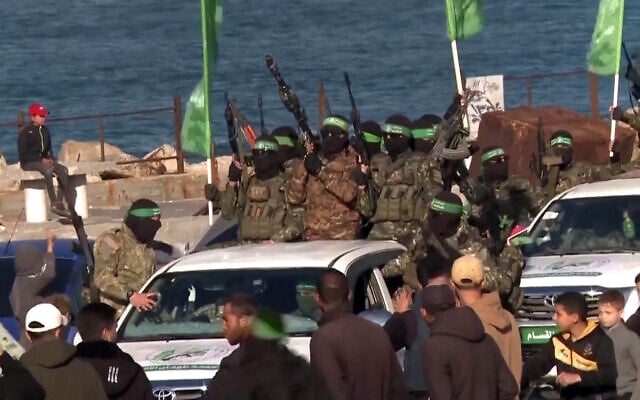 Hamas gunmen ride Toyota pick-up trucks through Gaza City ahead of the release of Israeli hostages on February 1, 2025 (Reuters screenshot)
Hamas gunmen ride Toyota pick-up trucks through Gaza City ahead of the release of Israeli hostages on February 1, 2025 (Reuters screenshot)So, too, now, as the government prepares to deepen Israel’s military responsibility for Gaza — to fully capture, take over, conquer, occupy or whatever designation proves most accurate — the concern is that Hamas, still a potent guerrilla force, constantly recruiting, will survive, and that the hostages may not.
The IDF may control 75% of Gaza today, but almost all of Gaza’s citizenry is in the other 25%. That’s why “full occupation” is so potentially loaded a term. Is Israel about to make itself directly responsible for 2 million Gazans? And is that why Zamir has reportedly warned Netanyahu: “You’re going to create a trap in Gaza”? Link
Cabinet reportedly weighing military plan that would begin with conquering Gaza City, ramping up aid
A reported plan for the full occupation of the Gaza Strip, expected to be presented for cabinet approval by Prime Minister Benjamin Netanyahu tomorrow, focuses initially on seizing Gaza City and expanding aid distribution centers in coordination with the United States, according to Hebrew media reports.
According to a Channel 12 report, in the plan’s first phase, Israel will issue an evacuation notice to the residents of Gaza City — estimated to number around 1 million people, roughly half the Strip’s population — to allow time for the establishment of civilian infrastructure in central Gaza, including hospitals and camps for evacuees. This phase is expected to last several weeks.
Israel would then launch a military offensive in the second phase, during which US President Donald Trump is expected to deliver a speech announcing the acceleration of humanitarian aid in coordination with Israel, the report continues. Under US-Israel coordination, the number of food distribution sites is expected to grow from four to 16, though the network did not clarify if all sites would be operated by the Israel- and US-backed Gaza Humanitarian Foundation.
The expansion would be funded by approximately USD 1 billion in donations from the US and other countries, Channel 12 adds, saying the goal would be to enable Gazans to access aid that bypasses Hamas while Gaza City falls under Israeli control.
The operation is reportedly designed to span several weeks, not months, and appears intended as a compromise with Chief of Staff Lt. Gen. Eyal Zamir, who has warned against a full invasion, by initially limiting the operation to Gaza City, thereby delaying full occupation.
A separate report from Ynet says the military campaign is expected to last four to five months and involve four to five IDF divisions. The civilian population is expected to be further pushed toward the southern Strip, while maneuvers take place in areas where hostages are believed to be held, with efforts toward avoiding any harm to them.
Channel 12 adds that the plan may endanger the hostages, who could be executed by Hamas if Israeli forces approach areas where they are held — as happened with six Israeli hostages slain in August 2024.
According to the network, the plan has two main goals: to pressure Hamas back into hostage talks, and to possibly align with a proposed US-led framework for a comprehensive deal. While Israel may pause operations if that framework advances, officials see it as unlikely, Channel 12 adds.
By the end of the cabinet meeting, Netanyahu is expected to seek a mandate to authorize himself and Defense Minister Israel Katz to make operational decisions, including phased steps.
Channel 12 reiterates that Zamir and other military officials have warned against the plan, quoting Zamir as saying in closed-door meetings: “Conquering the Strip would drag Israel into a black hole — taking responsibility for two million Palestinians, requiring a years-long clearing operation, exposing soldiers to guerrilla warfare and, most dangerously, jeopardizing the hostages.”
A senior security official also tells Channel 12: “We are entering a Vietnam model — with our eyes wide open.” Link
IDF chief talks up culture of dissent, indicates he won’t be cowed amid Gaza row
IDF Chief of Staff Lt. Gen. Eyal Zamir says disagreements are a “vital component” of the military, after recent reports have indicated tension between him and Prime Minister Benjamin Netanyahu over the premier’s plans to “occupy” the Gaza Strip, which the army is reported to oppose.
“A culture of disagreement is an inseparable part of the history of the people of Israel; it is a vital component of the IDF’s organizational culture, both internally and externally,” Zamir said during an assessment this morning with the military’s top brass, according to remarks released by the IDF.
“We will continue to express our positions without fear, in a substantive, independent, and professional manner,” he added.
Zamir has repeatedly clashed with the cabinet in recent days, notably over the government’s move to expand the war in Gaza, according to multiple reports, and sources in the Prime Minister’s Office have suggested that if he objects to the plan to occupy Gaza, he can resign.
His comments are published hours before a cabinet meeting this evening to discuss the Gaza occupation plans, indicating he will continue to push against the proposal.
“We are not dealing with theory; we are dealing with matters of life and death, with the defense of the state, and we do so while looking directly into the eyes of our soldiers and the citizens of the country,” Zamir added during the morning assessment, the army says. “We will continue to act with responsibility, integrity, and determination, with only the good of the state and its security before our eyes.”
According to Zamir, the IDF is “now approaching the final stages” of the military offensive against Hamas that was launched in May, which was more limited than the proposal now on the table.
“We have met and even exceeded the operation’s objectives, and we continue to act to ensure long-term security for the communities in the south,” he said.
“We intend to defeat and collapse Hamas. We will continue to act with our hostages in mind, and we will do everything to bring them home,” Zamir added.
The Region and the WorldUS to ease human rights criticism of Israel and other nations, Washington Post reports
The US State Department’s annual human rights reports show that President Donald Trump’s administration aims to scale back Washington’s criticism of certain foreign nations with records of rights abuse, the Washington Post reports.
The newspaper cites leaked drafts of the reports for Israel, Russia and El Salvador and says those are significantly shorter than the ones prepared by the administration of Democratic former president Joe Biden.
The State Department has not yet officially released this year’s reports, which cover last year’s incidents. Usually, these annual reports are released around March or April each year. Link interesting but not surprising us that all 3 of the countries Trump ordered to ease up on the human rights violations are authoritarian or almost authoritarian regimes. His favorite leaders are strong men autocrats.
UK envoy rejects idea that statehood recognition rewards Hamas
The United Kingdom’s announcement that it will recognize a Palestinian state in September unless Israel commits to ending the war in Gaza and to a long-term peace plan does not constitute a reward for Hamas, British ambassador to Israel Simon Walters tells Israeli reporters, pushing back against claims by Israeli and American leaders.
“It is absolutely categorically not [a reward],” says Walters, reiterating British Prime Minister Kier Starmer’s condemnation of the terror group and adding that Hamas’s vision does not align with the UK’s announcement — “they want the destruction of Israel, not the two-state solution.”
“I recognize that for many Israelis the idea of a Palestinian state is concerning, but the UK is deeply committed to Israeli security,” he says. He claims that Hamas statements welcoming the decision are merely “an attempt to claim some credit where they have achieved nothing.”
Walters emphasizes that the UK’s decision “is part of a larger package which is intended to isolate Hamas and point the way for a vision for peace in the Middle East.”
An important component of that plan is the statement signed by the Arab League and other Muslim and Arab states at a United Nations conference last month promoting the two-state solution — a statement he calls “really strategically important” that “hasn’t received enough attention.”
“If there was a peace process, if the Palestinian Authority and Israeli government were in regular dialogue about a permanent settlement to the conflict, we would consider our timing… to be part of that process; but there isn’t a process and that’s the problem,” he adds.
Walters also condemns settler violence in the West Bank, “for which [Israel] seems to [impose] no consequences.”
He highlights the urgency to address the “horrifying” humanitarian situation in Gaza, calling on Israel to allow “full unrestricted access” to aid.
Addressing Israel’s claims that Hamas systematically loots assistance and disrupts its distribution, Walters says, “Hamas stealing aid may be true… the evidence on that is mixed,” but urges a surge of aid into the Strip — as Israel attempted to do in March of last year — arguing that flooding Gaza with aid would disincentivize Hamas or others from stealing them.
He adds that failure to address the crisis is “also catastrophic for Israel,” pointing to “the damage it’s doing to Israel’s reputation” overseas.
Israeli ambassador in Paris visits vandalized El Al office
The Foreign Ministry says it “strongly condemns” vandalism at the Paris offices of national carrier El Al, which the airline said was smeared with red paint and pro-Palestinian, anti-Israel graffiti overnight.
Israeli Ambassador to France Joshua Zarka visited the scene “after speaking with the French interior minister,” the Foreign Ministry says, sharing photos of him there.
Both the envoy and the Israeli embassy in Paris “have been in continuous contact since this morning with the management of El Al’s Paris station,” it says.
Zarka described the vandalism as an “act of terrorism” that aims to “terrorize El Al employees, terrorize Israeli citizens, scare them and try to make them feel that they are not welcome,” according to AFP.
There is no comment from French authorities on the attack.
In a separate post on X, the ministry calls on the French government “to bring the perpetrators to justice and ensure the safety of the company’s staff and offices.”
“The antisemitic attacks in France must be dealt with the utmost severity,” the ministry adds.
El Al offices in Paris vandalized with pro-Palestinian, anti-Israel graffitiThe Paris offices of Israeli national carrier El Al were vandalized overnight with red paint and pro-Palestinian, anti-Israel graffiti, Israeli officials and the airline say.
Pictures posted online show the doors of the offices covered in paint and the words “Free Palestine” daubed in several places in a number of languages, along with graffiti reading “El Al genocide airline.”
Personal Stories
Acronyms and Glossary
ICC - International Criminal Court in the Hague
IJC - International Court of Justice in the Hague
MDA - Magen David Adom - Israel Ambulance Corp
PA - Palestinian Authority - President Mahmud Abbas, aka Abu Mazen
PMO- Prime Minister's Office
UAV - Unmanned Aerial vehicle, Drone. Could be used for surveillance and reconnaissance, or be weaponized with missiles or contain explosives for 'suicide' explosion mission
Join my Whatsapp update group https://chat.whatsapp.com/IQ3OtwE6ydxBeBAxWNziB0
Twitter - @LonnyB58 Bluesky - @lonny-b.bsky.social
My blogs in The Times of Israel my blogs
Substack - https://lonnyb.substack.com/
Twitter - @LonnyB58
My blogs in The Times of Israel my blogs
Substack - https://lonnyb.substack.com/

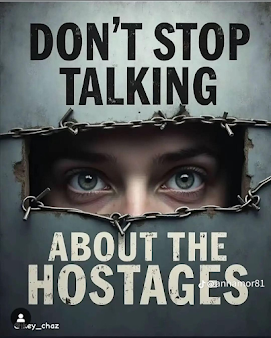







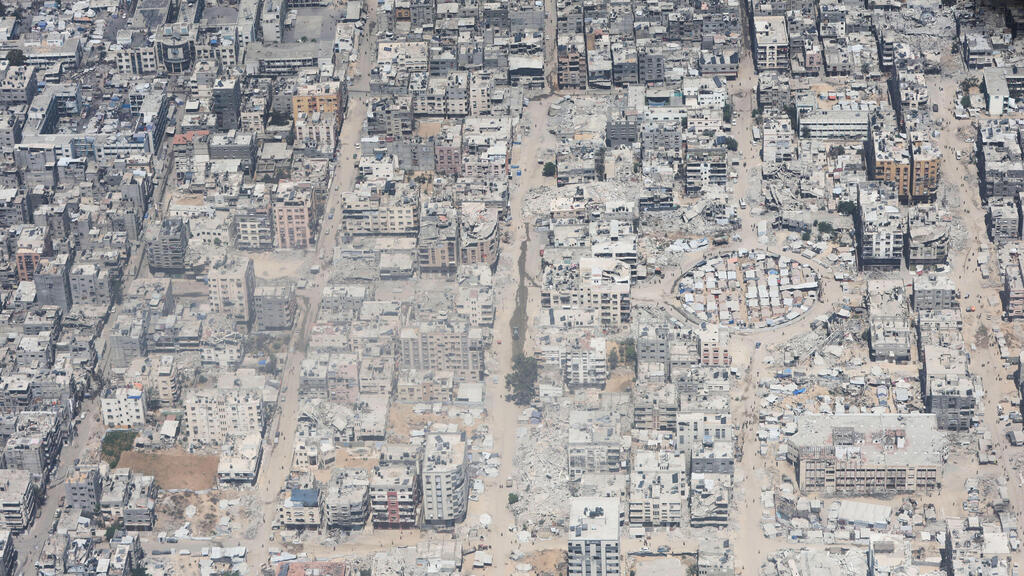

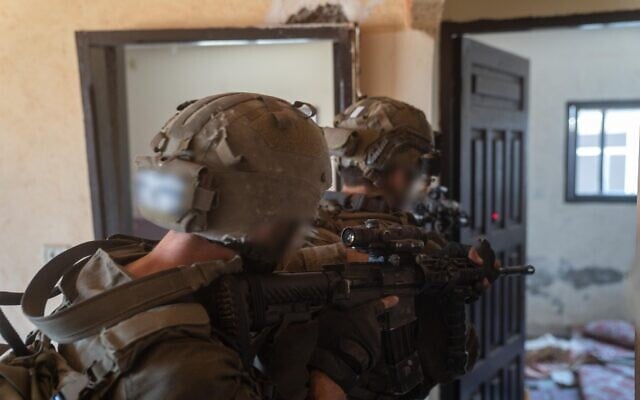
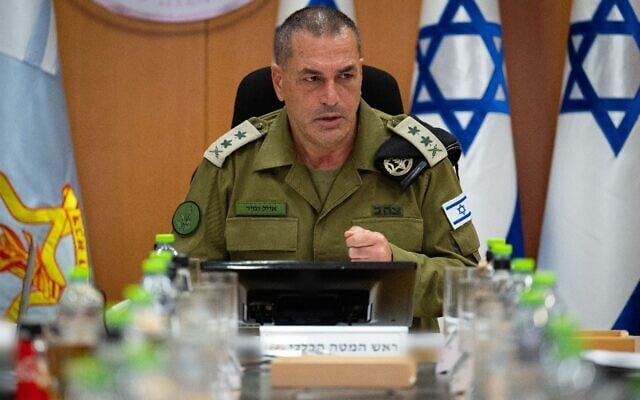
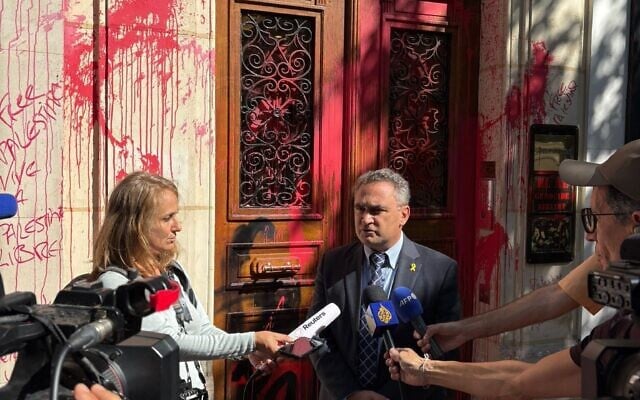


Comments
Post a Comment